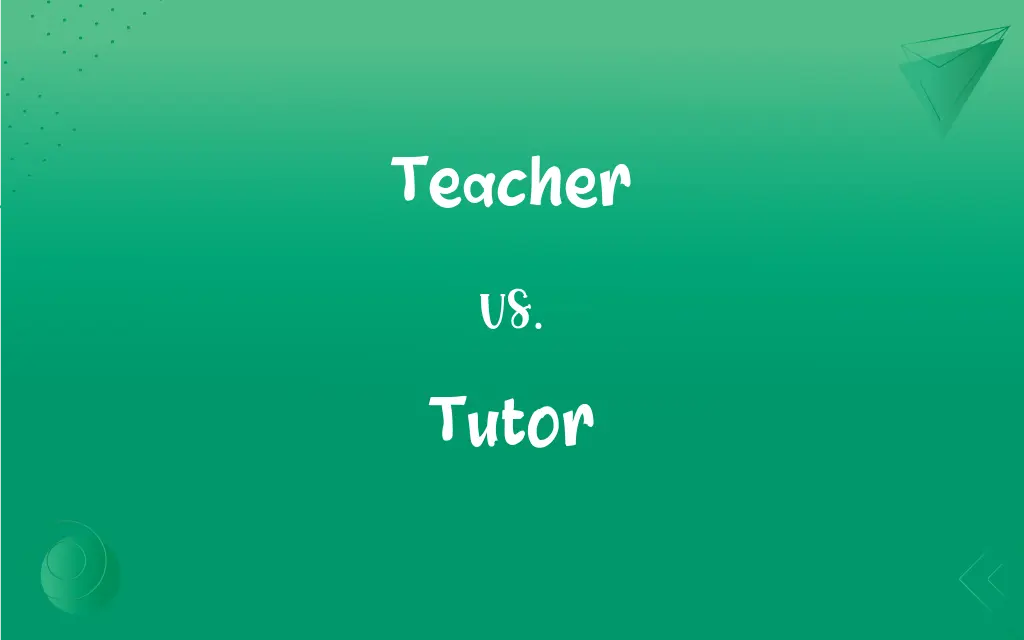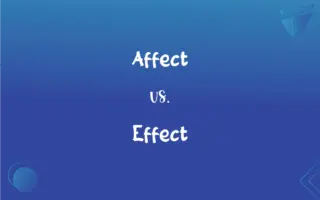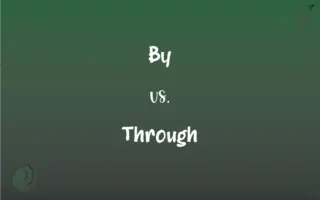Teacher vs. Tutor: What's the Difference?
Edited by Janet White || By Harlon Moss || Updated on October 18, 2023
A teacher is a professional who instructs a group in a classroom setting, while a tutor provides specialized instruction, typically one-on-one, outside of the classroom.

Key Differences
A teacher and a tutor both play pivotal roles in the realm of education, but their methods and settings often differ. A teacher is typically found in formal education settings, like schools and colleges. They are responsible for delivering curriculum to a group of students, ensuring that the entire class grasps the subject matter. Teachers follow a structured syllabus and employ various teaching methodologies to cater to the diverse learning needs of their students.
Conversely, a tutor generally works with individuals or small groups, focusing on specific areas that require attention. Tutors might help students who are struggling in particular subjects or those who wish to advance beyond what is being taught in the classroom. The setting for a tutor is often more flexible, ranging from home sessions, online platforms, or tutoring centers.
While a teacher's role is broad and covers the entirety of a subject or multiple subjects, a tutor's role is more specialized. Tutors delve deep into particular topics or areas where the student needs help, ensuring they understand and can apply the knowledge. The personalized approach of tutors is tailored to suit the individual learning pace and style of each student.
Teachers assess students based on periodic exams, assignments, and other evaluation methods to grade their overall understanding of the subject. Tutors, on the other hand, might provide feedback and minor assessments but usually don't assign grades. Their primary focus is on improving understanding and skills, rather than formal evaluation.
In essence, while both teachers and tutors are integral to the educational journey of a student, they serve different purposes. Teachers lay the foundation of a subject in a structured environment, whereas tutors build upon or reinforce that foundation in a more personalized setting.
ADVERTISEMENT
Comparison Chart
Primary Setting
Classroom in educational institutions.
Home, online, or tutoring centers.
Group Size
Usually teaches groups or classes.
Typically one-on-one or small groups.
Focus
Broad curriculum-based instruction.
Specific areas or topics of concern.
Assessment
Assigns grades based on tests, exams, assignments.
Provides feedback, rarely assigns formal grades.
Flexibility
Follows a structured syllabus.
Adapts to individual student needs.
ADVERTISEMENT
Teacher and Tutor Definitions
Teacher
A person who instructs students in a particular subject.
The math teacher explained the complex theorem with clarity.
Tutor
A person who gives individualized instruction, typically outside a classroom.
She hired a tutor to help her son with algebra.
Teacher
Someone who imparts knowledge or skills to others.
The dance teacher trained her students for the upcoming competition.
Tutor
An instructor in certain universities and colleges.
The philosophy tutor held extra sessions for interested students.
Teacher
A role model or influential figure who provides guidance.
He considered his grandfather his greatest teacher in life.
Tutor
Someone who assists in improving specific skills or knowledge.
The reading tutor helped the child boost his confidence.
Teacher
A person employed in an educational institution to deliver knowledge.
As a history teacher, she brought the past to life for her students.
Tutor
A private teacher, especially one who instructs a single pupil.
The prince had a tutor to educate him in statecraft.
Teacher
A leader or head of a religious group providing spiritual instruction.
The village revered the wise teacher for his profound insights.
Tutor
A person who provides guidance in specific tasks or challenges.
The tutor guided her through the process of writing her thesis.
Teacher
One who teaches, especially one hired to teach.
Tutor
A private instructor.
Teacher
A person who teaches, especially one employed in a school.
Tutor
One that gives additional, special, or remedial instruction.
FAQs
Can a teacher also be a tutor?
Yes, many teachers offer tutoring services outside of their regular teaching hours.
Is tutoring more expensive than regular schooling?
Often, tutoring can be more expensive on an hourly basis as it provides specialized, individualized instruction.
How do I know if I need a tutor?
If you're struggling in a specific subject or need personalized attention, hiring a tutor might be beneficial.
Do teachers require certification?
In most educational institutions, teachers require formal certifications or qualifications to teach.
How do teachers and tutors collaborate?
They can communicate to align on a student's needs, ensuring consistent and complementary instruction.
Is a teacher's role more general than a tutor's?
Typically, yes. Teachers cover the breadth of a curriculum while tutors focus on specific areas.
How do I choose a good tutor?
Consider their expertise, teaching style, reviews, and recommendations.
Can online platforms replace tutors?
Online platforms can offer tutoring services, but the efficacy depends on the student's learning style and the platform's quality.
What subjects can tutors cover?
Tutors can cover a wide range of subjects, from academics to skills like music or art.
Are teachers typically involved in curriculum development?
While some teachers participate, curriculum development is often a separate process.
Do all schools employ teachers with degrees?
Most formal schools require teachers to have degrees, but requirements can vary by region and institution.
Do teachers always work in schools?
Mostly, but teachers can also work in alternative settings like online platforms, private homes, or community centers.
Are teachers and tutors paid similarly?
Payment varies based on factors like location, expertise, and demand. Tutors may charge higher hourly rates, but teachers often have more consistent income.
Can I be tutored in a non-academic skill?
Definitely. Tutors can teach a variety of skills, from languages to musical instruments.
Can tutors help students with learning disabilities?
Yes, many tutors specialize in assisting students with specific learning challenges.
How do teachers adapt to different learning styles?
Experienced teachers employ various methodologies to cater to diverse learning needs.
Can tutors help with exam preparation?
Absolutely, many tutors specialize in preparing students for specific exams.
How do teachers manage large classrooms?
Through classroom management techniques, grouping strategies, and varied instructional methods.
What's the primary advantage of having a tutor?
Personalized instruction tailored to individual needs and learning pace.
How often should I meet with a tutor?
Frequency depends on individual needs but can range from once a week to daily sessions.
About Author
Written by
Harlon MossHarlon is a seasoned quality moderator and accomplished content writer for Difference Wiki. An alumnus of the prestigious University of California, he earned his degree in Computer Science. Leveraging his academic background, Harlon brings a meticulous and informed perspective to his work, ensuring content accuracy and excellence.
Edited by
Janet WhiteJanet White has been an esteemed writer and blogger for Difference Wiki. Holding a Master's degree in Science and Medical Journalism from the prestigious Boston University, she has consistently demonstrated her expertise and passion for her field. When she's not immersed in her work, Janet relishes her time exercising, delving into a good book, and cherishing moments with friends and family.
































































